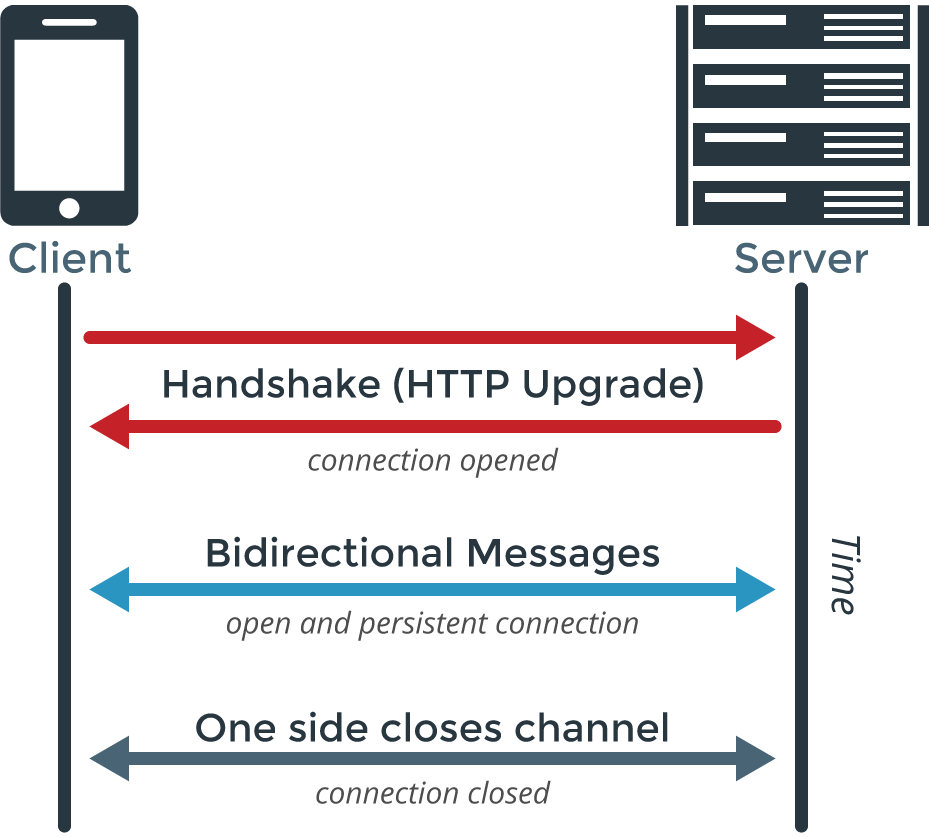Tiny Websockets
A minimal websockets implementation in C++. Aimed to provide a simple and slim interface for basic Websockets work. Currently contains a WebsocketsClient and a WebsocketsServer.
Key Features:
- Supports RFC-6455 features: Pings, Pongs, Data Messages ect.
- A Modern Callbacks-Based interface and a Blocking (sync) interface.
- Cross Platform, support: Windows, Linux, and Arduino (ESP8266 and ESP32, see ArduinoWebsockets)
- Websockets Client and Server APIs.
- Fully supports Fragmented Messages and streaming
- Supports Client-Side Websokcets over SSL/TLS
Table Of Contents
What are Websockets?
The Websockets Protocol is a way for clients and servers to exchange Messages over TCP in a known, common way. It is essentially a thin standard above raw TCP communication.
A typical Websockets communication consists of 2 Endpoints: a Client and a Server. Before Endpoints can communicate they must perform an handshake and negotiate over the protocol's Version, the usage of Sub-Protocols and more. The handshake is an important step in the communication, but will not be covered here as it is very low-level. You can read more about the proccess here.
Credit: taken from an article by Thilina Ashen Gamage
More details about the protocol can be found in the Wiki Page: What are Websockets?.
Getting Started
Installation
In order to get started and building the first TinyWebsockets demo on your machine, you should:
- Clone the repo
git clone https://github.com/gilmaimon/TinyWebsockets.git- Run cmake
mkdir build
cd build
cmake ..
make demo_echo_client- Run the demo:
./demo_echo_clientLinking to Your Own Project
CMake
Using cmake, first you need to incldue the library folder (named tiny_websockets_lib) as a subdirectory in your own project's CMakeLists.txt.
For example, if you place the directory under in libs/tiny_websockets_lib add to your CMakeLists.txt:
add_subdirectory(libs/tiny_websockets_lib)Then, add the library to the executable by adding:
target_link_libraries (my_executable tiny_websockets_lib)Usage
I recommend reading the examples below to get the basic usage of the library. For further reference, try the Wiki Docs.
Examples
This section shows some basic examples for server and client code using the library. More demos can be found in the root library directory (.cpp files with the prefix demo_).
Client
Example of basic WebsocketsClient usage:
#include <tiny_websockets/client.hpp>
#include <iostream>
using namespace websockets;
int main() {
// connect to host
WebsocketsClient client;
client.connect("http://localhost:8080");
// handle messages
client.onMessage([](WebsocketsMessage message) {
std::cout << "Got: " << message.data() << std::endl;
});
// handle events
client.onEvent([](WebsocketsEvent event, std::string data) {
// Handle "Pings", "Pongs" and other events
});
// send a message
client.send("Hi Server!");
while(client.available()) {
// wait for server messages and events
client.poll();
}
}Server
Example of basic WebsocketsServer usage:
#include <tiny_websockets/server.hpp>
#include <iostream>
using namespace websockets;
int main() {
WebsocketsServer server;
server.listen(8080);
// while possible
while(server.available()) {
// accept another client
WebsocketsClient client = server.accept();
// wait for a message for the client and send an echo response
auto message = client.readBlocking();
client.send("Echo: " + message.data());
// close the connection
client.close();
}
}
Contributing
There are many issues and missing features that can use a hand so Pull requests are welcomed.
For major changes, please open an issue first to discuss what you would like to change.
How to Contribute
The best and easiest way to help is to clone the library, test it for yourself and share any difficulties you have. You can share your opinion and experience on the interface, complexity or any issues and suggestions you have for the library.
Project Structure
The projects file structure is as follows:
.
├── tiny_websockets_lib/ # root library folder
| ├── include/tiny_websockets/
| | ├── internals/ # rules and base classes
| | | ├── wscrypto/ # crypto helpers (base64, sha1)
| | | ├── ...
| | | └── websockets_endpoint.hpp # WebsocketsEndpoint
| | ├── network/ # internal TCP clients
| | ├── ...
| | ├── message.hpp # WebsocketsMessage
| | ├── client.hpp # WebsocketsClient
| | └── server.hpp # WebsocketsServer
| ├── src/ # impl (.cpp) files
| └── CMakeLists.txt
|
├── tests
| ├── catch2/ # catch2 for writing tests
| ├── ext/ # helpers (such as a node ws server) for testing
| └── src/
| ├── some_feature_test.cpp # test file with main()
| ├── ... # test file with main()
| └── other_feature_test.cpp # test file with main()
|
├── CMakeLists.txt
├── demo_echo_client.cpp # demo program
├── ... # more demo programs
└── ... # more demo programsRunning the Tests
After making a change you would want to make sure the tests run properly and add your own tests.
In order to run the tests, execute this from the root directory:
mkdir build
cd build
cmake ..
make # see if build is successfull after changes
make test # check for CTest output after changesMissing Features
- Support for SSL/WSS - currently the library has only support client side and does not support creating ssl servers.
License
This project is Open Source and is licensed under the GNU General Public License v3.0.

